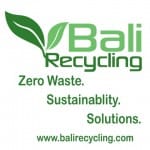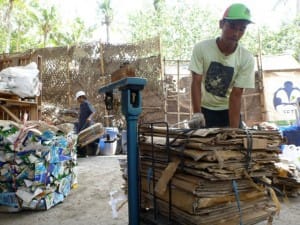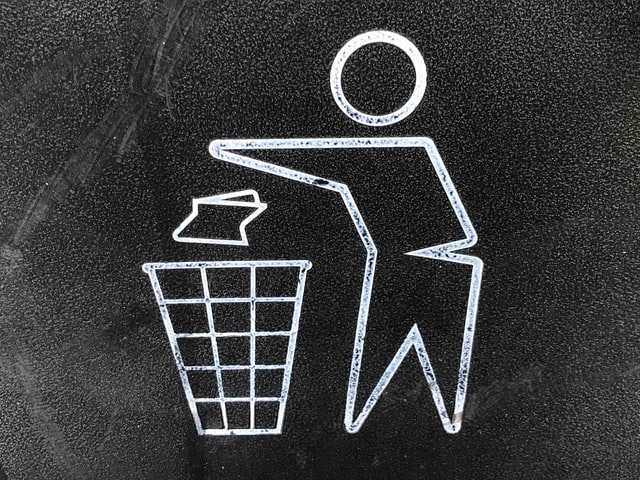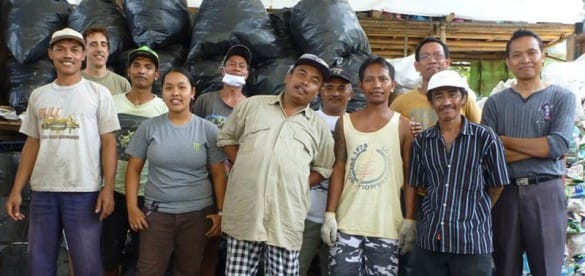In the mid-1990s, Olivier Pouillon saw a young child die at an illegal hotel dumpsite. The experience left a deep scar. Olivier resolved to do his part in trying to prevent something similar from ever happening again. Growing up in the U.S.A. and Asia, he graduated from Hunter College in 1993, New York City, majoring in environmental studies and political science. The young man first arrived in Bali in 1991 to study Indonesian culture, language and urban issues. In 1993 he returned to Bali and subsequently married a local girl, started raising a family and almost  immediately began his long involvement in the field of environment sustainability. From 1993 to 1998, Olivier worked for the Wisnu Foundation, Bali’s first Indonesian-established environmental organization. In 1995, he helped establish Jimbaran Lestari, the first private waste management company on the island. In 2009, after investigating pollution issues in the Ubud area, Olivier and his Indonesian business partners founded Bali Recycling (CV Peduli Bali, balirecycling.com), a social-environmental enterprise focusing on recycling and managing solid and hazardous waste in a responsible way.
immediately began his long involvement in the field of environment sustainability. From 1993 to 1998, Olivier worked for the Wisnu Foundation, Bali’s first Indonesian-established environmental organization. In 1995, he helped establish Jimbaran Lestari, the first private waste management company on the island. In 2009, after investigating pollution issues in the Ubud area, Olivier and his Indonesian business partners founded Bali Recycling (CV Peduli Bali, balirecycling.com), a social-environmental enterprise focusing on recycling and managing solid and hazardous waste in a responsible way.
What do you like best about your work?
This may surprise people but working in garbage is very interesting here with lots of dynamics and layers of intrigue. The situation is also changing very fast. It’s a challenge to do this kind of work and there are lots of sacrifices required, but we have been able to make progress and beginning to see positive changes. Although it might not be readily apparent, I believe that the future in waste management in Bali is very bright.
 What is unique about Bali Recycling’s services?
What is unique about Bali Recycling’s services?
We are the only fully licensed company that handles all types of waste, offering recycling services as well as proper hazardous waste disposal. It’s all about zero waste, sustainability and workable solutions.
What is your philosophy of waste disposal?
Waste is actually a man-made concept. In nature there is no such thing as waste, just cycles where nutrients and elements are endlessly recycled. We believe that we should follow the same approach. Waste really is a misuse of resources and we need to recover those resources, to ‘recycle’ those resources. Using methods like composting, creating biogas from putrid food waste and recycling non-organic wastes.
Can you give some examples of recyclables?
We can recycle many types of plastic bags, plastic containers, all types of paper, paperboard, cardboard, metals, aluminum, used wax, oils, glass bottles, e-waste, garden waste, food waste, biomass (wood/bamboo/coconut shells), and many more. Some things are not easily recycled, so we are finding ways to reuse it or recycle it such as candy bar and chip bag packaging with aluminum inner linings, plus styrofoam packaging, takeout containers and PVC food packaging. Then there are some things that are really dangerous and can’t be easily recycled such as fluorescent bulbs and dry cell batteries. These fall into the category of hazardous waste and also need to be safely disposed of.
Why is proper waste disposal important?
 People need to realize that they have to pay for this very basic but very necessary service. It doesn’t cost much but if you produce waste you must pay to have it taken care of. Many rubbish collectors are generally apathetic or unaware of the pollution they create. People should be aware that it’s not uncommon for scavengers and ad hoc collectors to buy the trash from hotels and restaurants then simply take the valuable recyclables and dump the rest illegally. They do this to avoid the costs associated with responsible disposal. The waste has changed, but the old attitudes and systems have not.
People need to realize that they have to pay for this very basic but very necessary service. It doesn’t cost much but if you produce waste you must pay to have it taken care of. Many rubbish collectors are generally apathetic or unaware of the pollution they create. People should be aware that it’s not uncommon for scavengers and ad hoc collectors to buy the trash from hotels and restaurants then simply take the valuable recyclables and dump the rest illegally. They do this to avoid the costs associated with responsible disposal. The waste has changed, but the old attitudes and systems have not.
How did this situation come about?
In less than one generation the waste profile completely changed in Bali. Thirty years ago there was very little man-made waste. Plastic was unusual. Traditional methods of throwing trash behind your home or in the river were totally appropriate. Also the population was less than half of what it is today. Bali, like the rest of Indonesia and the developing world, has experienced a huge population boom. Urban migration and economic development have introduced a consumptive consumer economy. The problems in Bali are only accentuated because all these things have been happening in a relatively small island.
Who are your customers?
What might be surprising to most Westerners is that most of our customers are Indonesians. There is a misconception held by many Westerners that locals don’t care about the environment and that they don’t get it. That’s not really the case. Just as you’ll find that not every Westerner is ‘eco conscious.’ Our number one customer demographic now is actually local housewives and students. We work with many restaurants and some hotels, but in sheer numbers we have over 1,000 Indonesian household customers.
What role does education have in promoting responsible garbage disposal?
Often the mantra from environmental social advocates on garbage is “people need to be educated about the problem” or “the solution is education.” Obviously, education about waste issues is important but it is really only one ingredient in a recipe for change. Without real and practical waste systems in place, education will not be enough. This has been the case in Indonesia where schools and government campaigns have educated the masses about garbage pollution, but without adequate waste infrastructure, no significant progress has really happened. Bali Recycling provides this needed infrastructure and tailors it to different groups to support a behavioral change in society.
Out of curiosity, what’s going to happen after the massive Suwung landfill fills up?
Suwung is already filled up! On the positive side, it has forced the issue of waste not to be ignored. I believe that we can completely change it around if we all can create systems where everybody stops making waste and instead creates “waste resources” that are returned back to nature or to industry. Imagine every hotel deciding to stop trucking out its waste and starts using its organic waste to produce life-giving compost to be used in its tropical gardens; that decides to stop polluting rivers and mangroves and instead initiates recycling programs. All of this is completely possible! We can all adopt these practices to some degree in our homes and businesses. None of this needs new technology, just a new perspective. Bali really has no environmental problems, just solutions waiting to be adopted.






